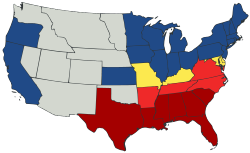Central Confederacy
 From Wikipedia - Reading time: 8 min
From Wikipedia - Reading time: 8 min

The Central Confederacy was a proposed nation made up of American states in the Upland South prior to the outbreak of the American Civil War in 1861.
Background
[edit]In December 1860 and January 1861, seven states in the southern United States declared secession from the US after the 1860 election of Abraham Lincoln, out of fear that he would hurt the institution of slavery. These southern states formed the Confederate States of America.
Some prominent figures from the Border Southern States suggested that the US should allow the southern states to secede peacefully.[1] In the Border South and Upper South states, there were also men who wanted their states to join the Confederacy.[2] Former Congressman John Pendleton Kennedy and Governor Thomas Hicks, both of Maryland, called for a Central Confederacy composed of the states of Virginia, Kentucky, Tennessee, Missouri, North Carolina, and Maryland.
The plan
[edit]Kennedy published a pamphlet entitled The Border States on December 15, 1860, that suggested the secession and confederation of six Border States: Virginia, Kentucky, Tennessee, Missouri, North Carolina, and Maryland.[3] Hicks advocated the plan in a January 2, 1861, letter to Delaware Governor William Burton.[4] As the southern Confederacy peacefully formed, sentiment among the newspapers and people of Maryland, Delaware, New Jersey, Pennsylvania, and New York were at its highest for the formation of a Central Confederacy.[5] However, this rhetoric reversed following the Confederate attack on Fort Sumter.
References
[edit]- ^ McPherson, James (1988). Battle Cry of Freedom. New York: Oxford University Press. pp. 276–306. ISBN 0-19-503863-0.
- ^ "The Civil War: The Senate's Story". United States Senate. Retrieved 22 June 2021.
- ^ Kennedy, John Pendleton (1861). The border states: their power and duty in the present disordered condition. Philadelphia: J. B. Lippincott & Co. ISBN 9780608415741. Retrieved 14 September 2023.
{{cite book}}: ISBN / Date incompatibility (help) - ^ "The Proposed Central Confederacy" (PDF). New York Times. June 24, 1900. Retrieved 17 January 2010.
- ^ "Efforts made to establish a Central Confederacy in 1861". Richmond Times. June 19, 1900 – via Southern Historical Society Papers, Volume 28.
In the absence of any written reply to my note of the 25th ultimo, I can only give your honorable body the result of the personal interview I had with the Governor, and I regret to say that I found him not only opposed to the secession of Maryland from the Federal Union, but that if she should withdraw from the Union he advised and would urge her to confederate with the Middle States in the formation of a central confederacy. He almost informed me that he had already, in his official character, entered into correspondence with the governors of those States, including New York, Pennsylvania, New Jersey, Delaware, Virginia, Missiouri and Ohio, with a view, in the event of an ultimate disruption of the Federal Union, to the establishment of such central confederacy.
 KSF
KSF